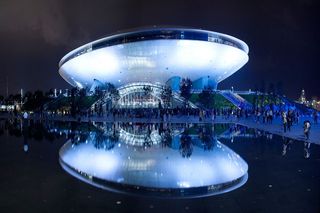The comedy and tragedy of the Dota 2 Shanghai Major

Documenting Chris' complex ongoing relationship with Dota 2. To read more Three Lane Highway, click here.
You either laugh or you cry. After the anger and drama of the Shanghai Major's opening days—and in spite of the genuinely excellent Dota that has happened and continues to happen—the event has consolidated itself as the world's first cringe comedy with a three million dollar prize pool.
We've been given a whole season in just a few days, starting with an incredible pilot episode that demonstrates a rare commitment to pushing a punchline until it stops being funny. Then: The One With The Starving Broadcast Director. The One With The Trapped Manager. The One With The Stranded Talent. The One With The Imprisoned Cosplayers. The One With The 'VIP' Room. The One With The Mystery X-Files Hell Noise. The One With The Missing Keyboard. The One With The Missing Audience.
Season-spanning running gags include massive delays, audio and video issues, unsoundproof soundproof booths that make you sick, and so on. And so on.
Good comedy twists the knife: the last Chinese team in contention was eliminated today. There are no hometown teams in the top eight, which is unprecedented for a region that at one point was considered to be the most competitive in the world. China’s star had fallen since, for sure, but I don’t think anybody expected a result this comprehensively poor. If you were wondering what the worst-case-scenario for the future of Dota as a spectator sport in China looked like, it looks like an 18,000-seater UFO full of mistakes.
The Shanghai Major has been a dis-AIII-ster, as TobiWan once put it, but for the most part its problems are true accidents. Asking 'why would they do this?' is as pointless in this context as it is in a game of Dota 2: if Valve or PerfectWorld had known it would be this way, they wouldn't have done it this way.
Were it not for the quality of the matches it would be tempting to write the whole thing off as a fiasco and move on.
And there are plenty of people working tirelessly to make sure that it doesn't stay this way. The new production team, struggling to get an international broadcast on its feet with only a few days' notice. The commentary teams from every territory, pulling double or even triple shifts to keep the event alive. The players, who have continued to turn out top-tier performances, who have flirted with rebellion here and there but never committed to open revolt. As baffling and terrible as it has been at times, the show has gone on.
It may be too late to save the narrative, however. This will be remembered as the Major that went wrong, and it'll hopefully be the only one—you've got to believe that the team in Manila is playing their own game of How Do We Make Sure This Isn't Us right now.
PC Gamer Newsletter
Sign up to get the best content of the week, and great gaming deals, as picked by the editors.
Then there's the existing narrative that these problems play into: the notion that professional Dota 2 in China must necessarily always encounter issues on this scale, something that isn't the case for League of Legends (and hasn’t been for Dota in the past) but that has been on the rise since the disastrous World Cyber Arena in January. This is a complex situation that requires serious and informed consideration, but in the short term all it has done is inspired an ugly racist streak in Twitch chat (something that Twitch chat has not traditionally needed help with.)
Were it not for the quality of the matches it would be tempting to write the whole thing off as a fiasco and move on. There's not much to be taken away from the problems of the playoffs save 'well maybe let's not do this again'—I feel, vicariously, a bit like I did when I missed my plane home after the Frankfurt Major because I was drunk. Slow zoom in on an idiot's face. Music. Credits.
Valve-as-enemy (particularly Gabe Newell-as-enemy) is a new angle for most.
The lasting significance of the Shanghai Major isn’t in the issues with its production, however, but in the event’s relationship with comedy in general: in the firing of James ‘2GD’ Harding and the extraordinary manner in which Gabe Newell and Valve chose to do it. This community has been let down by tournament showrunners before. It is telling that most assumed, when Harding announced that he’d been fired, that PerfectWorld were responsible. Valve have been absent and uncommunicative in the past, but they have never before set themselves in opposition to their audience’s most vocal element as visibly or unapologetically as this. Valve-as-enemy (particularly Gabe Newell-as-enemy) is a new angle for most.
With regard to their customers Valve like to position themselves as an Aikido master in a forest of spears: never striking first, always reacting, responding, redirecting. Their role is to watch, first and foremost, and to only take the most subtle, efficient and direct action. The notion that they're a purely data-driven studio has symbolic as well as practical value, hedging against the uncomfortable consequences of being responsible for quite so many players and developers. They are protected by the implication that it's not us that has all of this power, it's you.
The frank and personal nature of Newell's reddit post dispels that mystique—it's like discovering that your Aikido master has a gun down the back of his pants. The Zen openness of Valve's management structure suddenly looks a whole lot more Confucian, top-down, political and preference-driven.
I fully believe that Newell means what he wrote. It seems likely that it was necessary to fire Harding in order to protect the event, Valve's relationship with their partners, and possibly Valve's own sense of what they'd like Dota 2 to represent. Yet it is precisely because his sentiment was genuine, so directly put, and so much in opposition to community demand, that this series of events is so surprising. They moved against the data.
The situation has been rendered binary and oppositional—'ass or them'.
I'm of the opinion that this doesn't matter much if the decision was the right one. In fact, there are plenty of other instances where I've wanted Valve to take a stronger line—player behaviour being the standout example. In Harding’s case I’m not sure that they could have made any other call: he dropped a c-bomb, he made a government censorship joke about porn in arguably the worst country in the world to do that in. Perhaps in other circumstances these would be grounds to issue a warning but give him a chance to get it right on the second day. That’s not that the call that was made. Fine. Sometimes things work out that way.
Yet the audience’s takeaway from this isn’t that c-bombs aren’t allowed: it’s that humour isn’t allowed, that esports should aspire to the mode and manner of traditional sport. This is likely not the response that Valve wanted, but the aggressive and arrogant-sounding way in which they went about handling the Harding situation has driven his fans to his version of events. You’re either for humour and with Harding or you’re with Valve and you want your esports with a side of golf tournament. The situation has been rendered binary and oppositional—'ass or them'.
This question of tone is a useful discussion to have, or at least it was. Harding himself has argued eloquently in the past that esports are best served with humour, most notably in this (long) interview from last year’s International (which he wasn’t invited to host.) Some of the things he did on the Shanghai stream were, I thought, genuinely great: the silly games to get analysts to come out of their shells, the willingness to challenge the ego of a pro player every now and then. What the stream didn’t need was the dick jokes and the swearing and the deliberate attempts to make people uncomfortable—not because these things should be banned, but because there are smarter and funnier ways to entertain your audience. Fourteen year old boys may constitute a substantial part of the esports viewership, but they do not levy a tax in forced edgyness by default. You have to choose to pander to them.
Valve were, I thought, getting closer and closer to what I would perceive as the ideal third way: that esports are not beholden to the history of either sports or games.
In coming at this one so publicly and aggressively, Valve have drawn an equivalent emotional response from the community. Harding’s case for himself is built on a defensive reflex: esports were built by edgy boys in bedrooms, not billionaires in boardrooms. It is attractive to frame this as an existential fight for the industry’s future: alienated vs. predator. In truth, however, it’s an argument over which outdated idea is going to inherit the business. You can either have ‘games are for teenagers’ or you can have ‘sports are businesses’, and those are your only options.
Valve were, I thought, getting closer and closer to what I would perceive as the ideal third way: that esports are not beholden to the history of either sports or games. That they are their own, new thing, and can adopt business models and modes of conduct that haven’t been thought of yet. That they can be dramatic and lucrative and also silly and entertaining—that they can own the fact that they are ultimately high octane god damn wizard sports. That you can take the irreverence and wit of esports past and professionalise them, bring them to a bigger audience, make them for everybody.
Instead the situation has devolved into name-calling. You don’t have a discussion about what an esports panel performance should be. You don’t even have a dry and data-driven decision to simply give the loudest people what they want. You have Gabe Newell calling somebody an ass on reddit and his audience laughing through their tears at the dramatic irony of the Major’s subsequent collapse.
The scene will recover, but it’ll also remember—and because this is an esports community, it will remember in the form of memes. The real tragedy of this event isn’t the production. It’s Valve handling a delicate situation so badly that they've turned their own power into a joke.

PC Gamer Pro is dedicated to esports and competitive gaming. Check back every day for exciting, fun and informative articles about League of Legends, Dota 2, Hearthstone, CS:GO and more. GL HF!
Joining in 2011, Chris made his start with PC Gamer turning beautiful trees into magazines, first as a writer and later as deputy editor. Once PCG's reluctant MMO champion , his discovery of Dota 2 in 2012 led him to much darker, stranger places. In 2015, Chris became the editor of PC Gamer Pro, overseeing our online coverage of competitive gaming and esports. He left in 2017, and can be now found making games and recording the Crate & Crowbar podcast.
Most Popular


